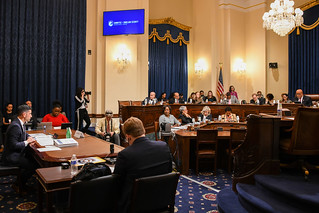The Future of DHS Project: Key Findings and Recommendations: Congressional Oversight
FORWARD DEFENSE
REPORT RELEASE
To enable the reforms DHS needs, Congress needs to provide more effective oversight
Forward Defense’s Future of DHS Project has previously assessed that the Department of Homeland Security (DHS) must refocus its mission, reform its approach to public-private partnerships and its management structure, and rebuild the morale of its workforce. In order for DHS to make these much-needed reforms, Forward Defense’s Thomas Warrick & Mark Massa recommend in a newly released report that Congress should consolidate its oversight of DHS by strengthening the role of the two core homeland security committees and making other reforms to enable Congress and DHS to work more effectively together.
Currently, oversight of DHS is spread out among more than ninety committees and subcommittees, in contrast to the way Congress deals with other national security departments like the Departments of Defense and State, each of which is overseen by one lead authorization committee and one Appropriations subcommittee.
Different components of DHS currently report to different congressional committees in ways that reflect the organization of the Federal government more than twenty years ago. When Congress established DHS in 2002, it cut away most of the stovepipes of authority and jurisdiction for the executive branch. However, Congress kept its own stovepipes of authority and jurisdiction in place. Congress denied to itself the same clarity of view that it gave to the executive branch.
Because of diffuse congressional oversight, Congress has not passed a comprehensive authorization law for DHS since the Homeland Security Act of 2002. By contrast, Congress passes an authorization bill for the Department of Defense almost every year, often with strong bipartisan support.
Key recommendations
To overcome this challenge, the Congress and DHS should work together to take the following actions:
- The US Senate and House of Representatives should each empower a single committee with comprehensive primary authorization and oversight jurisdiction over DHS and all of its components.
- The Senate should separate homeland security and government oversight into separate committees, as the House does.
- Congress can consolidate expertise by having other committee leaders who work with specialized DHS components sit ex officio on homeland security subcommittees.
- DHS’s Office of Legislative Affairs should have more authority to ensure headquarters and components adopt coordinated positions on important legislative policy and resource decisions.
Congress does have the obligation to choose one [oversight committee] in the House and one in the Senate, and that this committee should be a permanent standing committee with a nonpartisan staff
About the authors
Watch our panel discussion on congressional oversight of DHS
Subscribe
Sign up for updates from Forward Defense to hear the latest on the trends, technologies, and military challenges shaping tomorrow.

Forward Defense, housed within the Scowcroft Center for Strategy and Security, generates ideas and connects stakeholders in the defense ecosystem to promote an enduring military advantage for the United States, its allies, and partners. Our work identifies the defense strategies, capabilities, and resources the United States needs to deter and, if necessary, prevail in future conflict.


